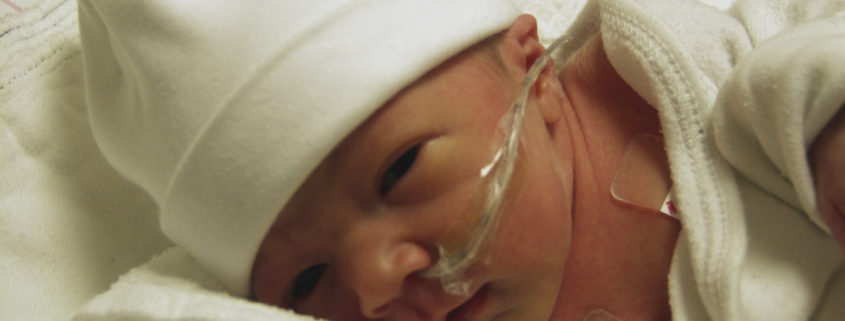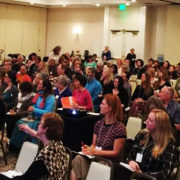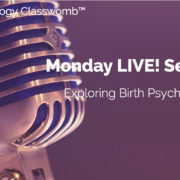One Woman’s Mission: Turn Tragedy into Call for Education and Change with Help of 12 Guiding Principles-PPN
Last week I received a deeply moving email from Professor Luisella Magnani, faculty at the Catholic University of Milan, Italy. Her heartbreaking story compels us to examine the way we care for our sick babies. In her own words:
I take the liberty of writing you in order to tell you that I am studying the 12 Guiding Principles – Prenatal and Perinatal Psychology with great interest. I completely and absolutely agree with you, with each word breathing in them.I am a Professor of Linguistic and Aesthetics and since 2010 I have been studying pain in Prenatal-Perinatal-and-Preverbal age.
I am my little Giampaolo’s aunt. Giampaolo was diagnosed the acute lymphoblastic leukemia on 8th March 2010, at 12 months. He died after months of great pain and distress at 19 months, in PICU, on 17th October 2010.
He was cared for only pharmacologically. His communications of the pain he endured–his crying, gestures, signs, vocalizations, movements were undervalued, underestimated, underconsidered because as one said, “He is too little.” (to meaningfully experience and communicate his pain).
On the diagnosis day, I contacted the hospital where he was cared for, in order to help Giampaolo feel understood, considered, and shared in all his needs, but I was never permitted to approach him because I am not a health care professional.
After his death, in 2010, I pursued my studies in memory of him and all the children in pain in the world. I am an Individual Member of the Association for Prenatal and Perinatal Psychology and Health.
I want to inform you that soon I will hold lessons at the University of Studies of Insubria of Varese, Paediatric Clinic, at the Faculty of Obstetrics, and I ask for the permission to speak about the 12 Guiding Principle-PPN. I thank you so much for having written them.
These Guiding Principles are Light – Light of Knowledge.
My best regards,
Luisella Magnani
University Institute in Sciences of Linguistic Mediation of Varese, Catholic University of Milan, Affiliation with the University of Studies of Insubria of Varese – Paediatric Clinic, Advocate for Italy, The Paediatric Palliative, The International Children’s Palliative Care Network
Prenatal and Perinatal Psychology clinical findings demonstrate that babies do feel pain.
For a seminal article about babies experiencing pain: Chamberlain, David B. (1989). Babies Remember Pain. Pre- and Peri-natal Journal 3. 4 (Summer), 297-310.
Babies’ expressions and communication of pain and suffering are meaningful. Like children and adults, babies need people who love and care about them to be with them during hospitalizations, painful procedures, and illnesses. They need compassionate and empathetic acknowledgement and direct communication with them about their pain, and they need human comfort and touch.
We are in a grand transition in our understandings of who babies are, what they are capable of, what they need, and how we can best support and nurture them from the beginning of life.
Those of us who have been PPN-oriented therapists working with babies, children, and adults, have direct experience of working with their early life experiences of pain, fear, overwhelm, trauma and unmet needs.
Some of the most intense early experiences and imprints can come from early hospitalizations in which they did not feel the adults (professionals and/or family) understood what they were going through and the physical and emotional pain they were experiencing. They express how deeply they needed people to communicate and respond to them as the aware, sentient, and feeling person they were as that baby. They needed love, comfort and physical connection, like skin-to-skin care.
12 Guiding Principles–Prenatal and Perinatal Psychology
We began the 12 Guiding Principle Project to distill what we had learned clinically from working with babies, children, and adults from the baby’s point of view of their early experience. We wanted to create a proclamation that would capture the essence of our clinical findings, what we had come to value, and our recommendations for caring for babies and families from pre-conception through baby’s first year.
The Association of Prenatal and Perinatal Psychology and Health, our association, endorses and adopted the 12 Guiding Principles-PPN.
We want to support people like Professor Luisella Magnani in her pursuit to educate and bring change. The 12 guiding principles speak directly to the new understanding of babies, their sentience, needs, and best practice of care.
The 12 Guiding Principles are meant to support you and those you care about that can benefit from our prenatal and perinatal psychology findings, values, and recommendations.
For those of you who have incorporated PPN in your practice and teachings, the 12 Guiding Principles are meant to support you in conveying the essence from our field.
When you present your PPN-oriented philosophy, practice, protocols to others, these 12 Guiding Principles can back you up.
* They are easy to create presentations and talking points from.
* They originate from leading PPN clinicians and years of clinical findings.
* They guided graduate studies to train PPN professionals.
* APPPAH, your association, endorses them.
Again, they are your support as you bring PPN to your families and clients, as well as when you talk with practitioners, medical staff, parents, and your community.
The official 12 Guiding Principle –Prenatal and Perinatal Psychology Brochure is available as digital and print brochures at www.12guidingprinciple-ppn.com
I am very grateful to Professor Luisella Magnani and all of you who are bringing this new understanding to your people to evolve our practices and protocols.
If you would like a customized presentation or training in the 12 Guiding Principles-PPN for your group or organization, please contact Dr. Wendy Anne McCarty and Dr. Marti Glenn.









